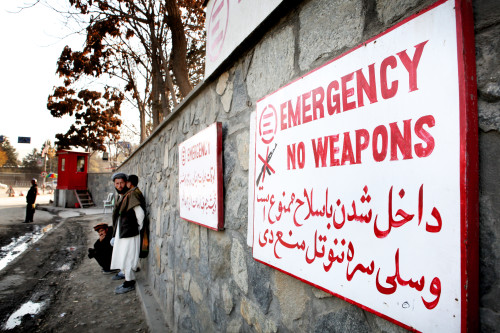The Royal College of Surgeons of England is one of the world’s most renowned and…

Thank You From Kabul
Michela, EMERGENCY’s Medical Coordinator in Kabul, reflects on the expansion of our hospital in Afghanistan’s capital city.

“In our Kabul hospital days don’t end at sunset. Certain nights, it feels as if the wounded will never stop coming.”
“Those who were wounded in the city, those who were stabilised in our First Aid Posts (FAPs), those who crossed Afghanistan in the trunk of a car to reach our hospital as it is their only chance to be treated for free: they all keep coming.”
“The Kabul hospital is a point of reference for all the war victims of a very wide area in the north-middle of the country, where our 9 FAPs form a real health network. This system works, and it works well.”
“Seeing an ambulance arriving from Ghazni (a province where the fighting is very intense) transporting a patient on a backboard, with oxygen and a nurse at his side, is the result of a little revolution in the approach to treating the wounded – an approach that never existed in this country before.”
“I’m amazed at the monthly statistics while I work on my computer. I had not realised the amount of work we faced this month: in July alone, we admitted 362 new patients and re-admitted another 77 to complete previously performed surgery. It is truly disheartening to see how this country is falling into an increasingly desperate situation amidst complete international indifference.”
According to the latest UNAMA (United Nations Assistance Mission in Afghanistan) report, in the first 6 months of the year war caused 4,921 civil victims, 1,592 of which died and 3,329 have serious injuries. I have been working in Afghanistan for 6 years now and I cannot remember a single moment of peace.”
“But I am proud of what we have built while chaos was growing around us: a hospital that has become a reference point and an excellent group of people – nationals and internationals – who make sure that everything runs like a clockwork, with no hitches and no mistakes. Nurses, surgeons, physical therapists, tilers, radiology technicians: everyone is passionate and always ready to give more, so that this place can be the best place to be treated in Afghanistan.”
“These are the people that make possible what seemed to be impossible. Because if you manage to cure 400 patients in a month in a hospital with the capacity of 100 while construction workers are renovating the surgery unit, then you know you are doing a good job.”

I wrote those words in July. I’m re-reading them now and it feels like a century has passed.
August was another very intense month, with 355 admitted patients, 76 readmitted and the biggest mass casualty I have ever seen.
On the night of August 7, a truck bomb exploded in a neighbourhood nearby causing a dozen victims and 400 wounded. It was one of the longest, hardest nights of my life as a nurse: 92 people arrived, 42 admitted, our operating rooms worked for 12 hours non-stop. A constant swarm of people, frightened children, seriously injured patients, incredulous faces; everyone packed under the emergency tents waiting for their turn. At the first light of dawn, A&E was still working.
At 8am, I found myself wondering how we had managed to admit all those people and perform so many surgeries. And while I was sitting on a bench in front of A&E, I realised the answer was right before my eyes: 3 new operating rooms and the renovated ICU with 15 additional beds. Inside those walls, 6 surgeons, 4 anesthetists and 6 nurses had been working non stop since 1am. They had already operated on 20 people and now they were dealing with the less seriously injured. The third new operating room allowed us to handle this emergency with no delays.
I think back to what has happened this last month: the mass casualty, the opening of a new FAP in Ghorband, the tremendous efforts of our tilers, electricians, logisticians and biomedical staff to complete the last part of the new unit, the new ICU – unfortunately immediately full. Because, sadly, it is like that here: it’s never enough.
In the last 3 months we admitted over 1000 patients; they come from far away provinces in critical conditions, often because they cannot reach a hospital quickly enough. The registers in Kabul mark an increase of 35% compared to last year and there is no sign of any decrease.
I would like to take a moment to thank all those who made it possible through their support to expand this hospital, and to allow us to better cure those who really need it. However, the war continues, the wounded keep coming and they cannot wait.
Michela, EMERGENCY Medical Coordinator in Kabul.



